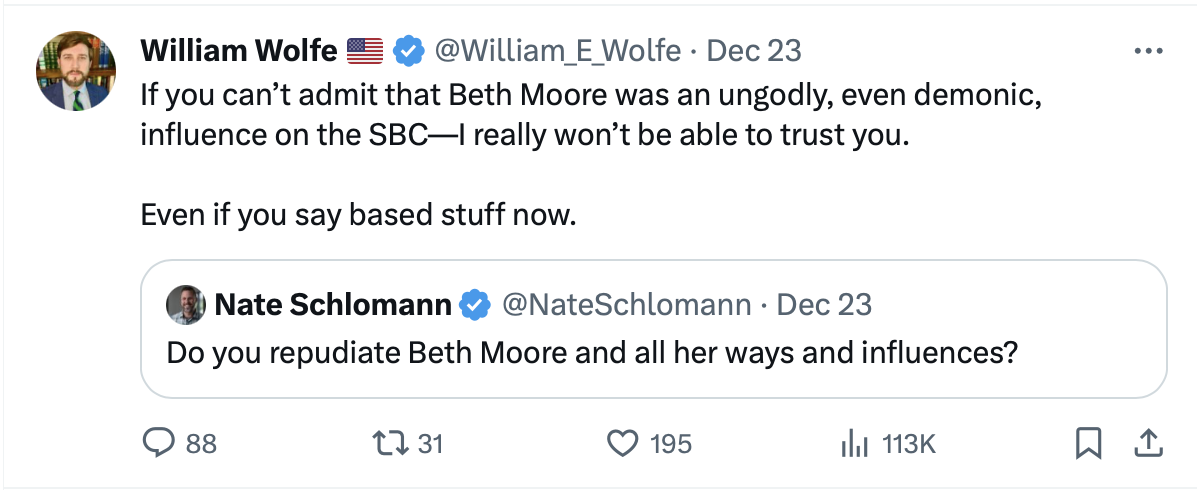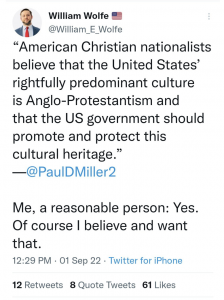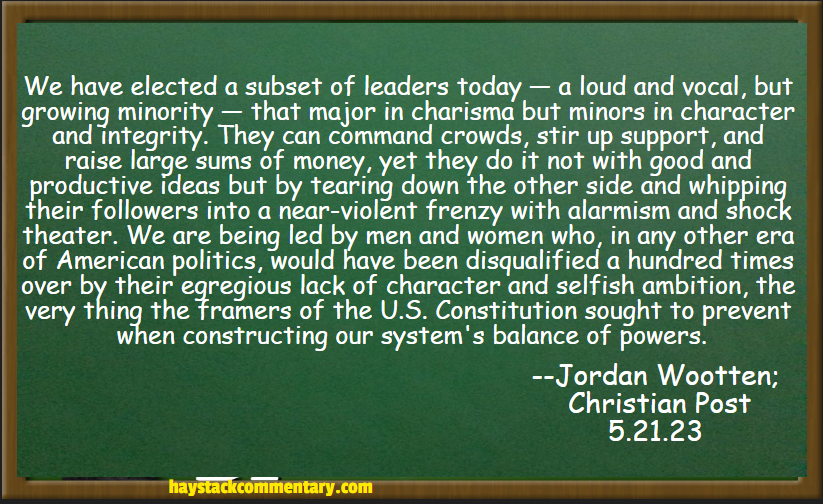- Ben Witherington III - Michael Wittmer - Jacob Wolf - Stephen Wolfe - William Wolfe - Nicholas Wolterstorff - Andrew Wommack - Elizabeth Woning - Andy Wood - Stacie Wood - John Woods - Cassie Woolworth - Jordan Wooten - Darrell Worley - Molly Worthen - Mike Woundy - Brent Wright - Mary Ellen Wright - Matthew Wright - Robert Wuthnow - Adam Wyatt -
==Ben witherington III==============
Ben Witherington III (born December 30, 1951 in High Point, North Carolina) is an American Wesleyan-Arminian New Testament scholar. Witherington is Professor of New Testament Interpretation at Asbury Theological Seminary, a Wesleyan-Holiness seminary in Wilmore, Kentucky, and an ordained pastor in the United Methodist Church.
How New Testament writers viewed Old Testament prophecy
The book of Isaiah is mentioned 250 times in the New Testament, more than any other Old Testament book, according to biblical scholar Ben Witherington III. “The Isaiah citations are used as source texts, proof texts and subtexts, echoing and alluding to Isaiah’s prophecies,” Witherington said.
(Jeffrey Stevens/Jerusalem Post 4/4/22) READ MORE>>>>>
The book of Isaiah is mentioned 250 times in the New Testament, more than any other Old Testament book, according to biblical scholar Ben Witherington III. “The Isaiah citations are used as source texts, proof texts and subtexts, echoing and alluding to Isaiah’s prophecies,” Witherington said.
(Jeffrey Stevens/Jerusalem Post 4/4/22) READ MORE>>>>>
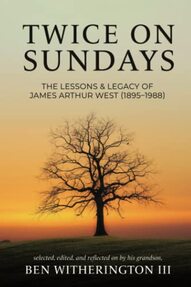
This book called the Bible contains the mind of God, the state of humankind, the way of salvation, the doom of sinners, and the happiness of believers. Its doctrines are holy, its precepts are binding, its histories are true, and its decisions are immutable. Read it to be wise, believe it to be safe, and practice it to be holy. It contains light to direct you, food to support you and comfort to cheer you. It is the traveler’s map, the pilgrim’s staff, the pilot’s compass, the soldier’s sword and the Christian’s charter. Here paradise is restored, heaven opened, and the gates of Hell disclosed. Christ is its grand subject, our good its design, and the glory of God its end. It should fill the memory, rule the heart, and guide the feet. Read it slowly, frequently, prayerfully. It is a mine of wealth, a paradise of glory, and a river of pleasure. It is given to you in this life, will be opened at the judgment, and be remembered forever. It involves the highest responsibility, rewards the greatest labor, and condemns all those who trifle with its holy contents. This friend will all our needs supply. This fountain sends forth streams of joy. This good Physician gives us health. This sun renews and warms the soul. This sword both wounds and heals and makes us whole. This book shows us our sins forgiven. This guide conducts us safely to heaven. This charter has been sealed with blood. This volume is the Word of God. FOLLOW IT.
==michael wittmer===============
Michael E. Wittmer (PhD, Calvin Theological Seminary) is professor of systematic and historical theology and director of the Center for Christian Worldview at Cornerstone University.
 Michael E Witmer Files
Michael E Witmer Files
Every discovery begins with doubt, and the largest doubts lead to the biggest breakthroughs. Job dared to charge God with injustice, "Why have you made me your target?" "Why do you hide your face and consider me your enemy?" (Jon 7:20; 13:24). When God finally gave Job his day in court, Job realized that he was the one on trial, and he pled no contest. "Surely I spoke of things I did not understand, things too wonderful for me to know," he said. "Therefore I despise myself and repent in dust and ashes" (Job 42:2,6) -Michael E Wittmer; Despite Doubt; 2013
--jacob wolf-----------------------
Jacob Wolf is Assistant Professor of Government in the College of Arts and Sciences and the Honors College at Regent University in Virginia Beach, VA. Prior to this, he was the 2020-2021 John and Daria Barry Postdoctoral Fellow in the James Madison Program at Princeton University. His expertise lies at the nexus of American politics and political philosophy, and his scholarly research investigates the theological origins of modern politics and the political origins of modern theology. He writes frequently on how democracy and individualism have changed the beliefs and practices of religion in modern America. He received his Ph.D. in Political Science from Boston College.
 Jacob Wolf
Jacob Wolf
Without much overstatement, one can describe the history of modern political philosophy as the search for a suitable replacement for Christianity. Progress replaces providence, humanitarianism replaces charity, and mind (or reason) replaces God himself. Into the void left behind by Christianity have rushed all sorts of ideologies—that is, comprehensive systems of belief that purport to explain the whole of human thought, action, and purpose.
-Jacob Wolf; Public Discourse; The Religion of Democracy 7.2.23
-Jacob Wolf; Public Discourse; The Religion of Democracy 7.2.23
--stephen wolfe------------------
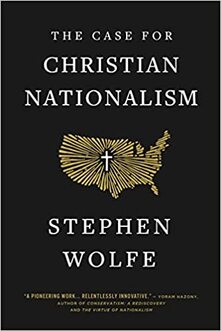
For Wolfe, the future is a strong nation, and a strong nation happens to be the Christian one. The church’s witness of a future Kingdom, the faithfulness of God, and the “weak things of the world shaming the strong” barely register. Wolfe’s only response to opposition is a Nietzschean-like challenge: Does a Christian man (yes, male) have the strength of will to impose his vision of Christian life and law onto a vacuum of secularist life? There is only one answer he will accept. And anyone who disagrees with him has submitted to the contradictions of an Enlightenment-infused liberal agenda and is close to embracing the progressive excesses of the left.
Wolfe’s work could function all too well as a theological and philosophical foundation for some of the worst impulses in our all-too-human hearts. It lays the foundation for Caesaropapism, a renewing of racial divisions within society and church, blurred lines of church and state authorities, overly ambitious civil laws, and brute power politics. Wolfe is himself careful to avoid invoking the “nationalism” of the 1930s and ’40s, content to defend a “phenomenological nationalism,” or, “the lived experience” of associating with one’s own. Nonetheless, Wolfe writes a manifesto that in the wrong hands could do great harm.
As I read The Case for Christian Nationalism, I admit to empathizing in places. Often I even agreed. To the average college student, I am the bad guy: white, straight, male, upper-middle class, a Christian pastor. I know that the Gender Studies department on my campus teaches a vision of humanity that is, by my Christian lights, anti-human. Wolfe correctly senses these errors. But he goes the wrong way in search of a solution. He dignifies sinful natural impulses to generate a will to power, and he tries to match a leftist power narrative with a Christian nationalist one—an eye for an eye, or rather, a blow for a blow. For Wolfe, the meek not only cannot inherit the earth—they ought not. They simply don’t deserve it.
This is no way forward for Christians. Our faith depends on the power of weakness. The meek shall inherit the earth. God will use the weak to shame the strong. I trust this, not because I deduce or intuit it or even because my tradition confesses it, but because God’s Word tells me. That is enough for my family—and for my nation.
---------Jonathan Clark; Reformed University Fellowship in Colorado Springs, Colo.; Jan 18, 2023
Wolfe’s work could function all too well as a theological and philosophical foundation for some of the worst impulses in our all-too-human hearts. It lays the foundation for Caesaropapism, a renewing of racial divisions within society and church, blurred lines of church and state authorities, overly ambitious civil laws, and brute power politics. Wolfe is himself careful to avoid invoking the “nationalism” of the 1930s and ’40s, content to defend a “phenomenological nationalism,” or, “the lived experience” of associating with one’s own. Nonetheless, Wolfe writes a manifesto that in the wrong hands could do great harm.
As I read The Case for Christian Nationalism, I admit to empathizing in places. Often I even agreed. To the average college student, I am the bad guy: white, straight, male, upper-middle class, a Christian pastor. I know that the Gender Studies department on my campus teaches a vision of humanity that is, by my Christian lights, anti-human. Wolfe correctly senses these errors. But he goes the wrong way in search of a solution. He dignifies sinful natural impulses to generate a will to power, and he tries to match a leftist power narrative with a Christian nationalist one—an eye for an eye, or rather, a blow for a blow. For Wolfe, the meek not only cannot inherit the earth—they ought not. They simply don’t deserve it.
This is no way forward for Christians. Our faith depends on the power of weakness. The meek shall inherit the earth. God will use the weak to shame the strong. I trust this, not because I deduce or intuit it or even because my tradition confesses it, but because God’s Word tells me. That is enough for my family—and for my nation.
---------Jonathan Clark; Reformed University Fellowship in Colorado Springs, Colo.; Jan 18, 2023
==willliam wolfe============
|
When angry white men can’t give up hating Beth Moore
Exhibit A is William Wolfe, a former Trump staff member and former intern to Southern Baptist Theological Seminary President Al Mohler. Wolfe is a self-described Christian nationalist who frequently uses his X account to post inflammatory statements of white supremacy, Christian supremacy and male supremacy. The latest came Dec. 23 when he tweeted: “If you can’t admit that Beth Moore was an ungodly, even demonic, influence on the SBC — I really won’t be able to trust you.” (Mark Wingfield/Baptist News Global 12/28/23) READ MORE>>>>> |
|
Russell Moore, Karen Swallow Prior Spark Outrage for Saying They Don’t Enjoy ‘The Pilgrim’s Progress’ Various people, including commentator William Wolfe, an outspoken supporter of Christian nationalism, and Founders Ministries president Tom Ascol, responded critically to Prior and Moore. “The admissions in this exchange explain a lot,” said Ascol, retweeting a circulating clip of the conversation. “Its [sic] not Scripture, but if this story leaves you cold, it might be indicative of a much deeper issue,” said another user. (Jessica Lea/Church Leaders 8/25/23) Read More>>>>> |
--nicolas wolterstoff--------
Nicholas Paul Wolterstorff (born January 21, 1932) is an American philosopher and theologian. He is currently Noah Porter Professor Emeritus of Philosophical Theology at Yale University. A prolific writer with wide-ranging philosophical and theological interests, he has written books on aesthetics, epistemology, political philosophy, philosophy of religion, metaphysics, and philosophy of education. In Faith and Rationality, Wolterstorff, Alvin Plantinga, and William Alston developed and expanded upon a view of religious epistemology that has come to be known as Reformed epistemology. He also helped to establish the journal Faith and Philosophy and the Society of Christian Philosophers.
 Nicolas Wolterstoff
Nicolas Wolterstoff
“Faith is not an addendum to our existence, a theological virtue, one among others. The faith to which we are called is the fundamental energizer of our lives. Authentic faith transforms us; it leads us to sell all and follow the Lord. The idea is not, once again, that everything in the life of the believer is different. The idea is rather that no dimension of life is closed off to the transforming power of the Spirit — since no dimension of life is closed off to the ravages of sin. But faith, in turn, is only one component in God’s program of redemption. The scope of divine redemption is not just the saving of lost souls but the renewal of life — and more even than that: the renewal of all creation. Redemption is for flourishing.” - Nicolas Wolterstoff
 Nicolas Wolterstoff
Nicolas Wolterstoff
“But we all suffer. For we all prize and love; and in this present existence of ours, prizing and loving yield suffering. Love in our world is suffering love. Some do not suffer much, though, for they do not love much. Suffering is for the loving. This, said Jesus, is the command of the Holy One: "You shall love your neighbor as yourself." In commanding us to love, God invites us to suffer.” ― Nicholas Wolterstorff, Lament for a Son
==andrew wommack======
Christian media figures may face defamation trials before November election
Conspiracy theorist Dinesh D’Souza helped create the 2000 Mules movie and its companion book. Both claim some 2,000 human “mules” harvested 400,000 fake ballots to steal the 2020 election from Trump.
The film has aired on Christian TV networks, was shown in hundreds of churches and was promoted by Metaxas, Andrew Wommack, Charisma magazine, MovieGuide, and Mike Huckabee, the honorary national chairman of My Faith Votes. But the movie’s claims are false. One of the alleged “mules” was a Black man named Mark Andrews. The film used footage of Andrews during an appearance on Tucker Carlson’s former show on Fox News, and a photo of Andrews was published in a companion book published by Salem-owned Regnery Publishing. The photo caption said Andrews was engaged in “organized crime.” Andrews sued D’Souza, Salem Media, Regnery and the organization True the Vote. Attorneys defending the film admitted in court they have no evidence to support the film’s wild claims.
(Baptist News Global 6.4.24) Read More>>>>>
Conspiracy theorist Dinesh D’Souza helped create the 2000 Mules movie and its companion book. Both claim some 2,000 human “mules” harvested 400,000 fake ballots to steal the 2020 election from Trump.
The film has aired on Christian TV networks, was shown in hundreds of churches and was promoted by Metaxas, Andrew Wommack, Charisma magazine, MovieGuide, and Mike Huckabee, the honorary national chairman of My Faith Votes. But the movie’s claims are false. One of the alleged “mules” was a Black man named Mark Andrews. The film used footage of Andrews during an appearance on Tucker Carlson’s former show on Fox News, and a photo of Andrews was published in a companion book published by Salem-owned Regnery Publishing. The photo caption said Andrews was engaged in “organized crime.” Andrews sued D’Souza, Salem Media, Regnery and the organization True the Vote. Attorneys defending the film admitted in court they have no evidence to support the film’s wild claims.
(Baptist News Global 6.4.24) Read More>>>>>
America engaged in ‘battle of worldviews,’ Mike Johnson tells Christian lawmakers group
Andrew Wommack, founder of the far-right group Wommack Ministries and Charis Bible College, received the George Washington Lifetime Christian Leadership Award from the group. Wommack is an outspoken Christian nationalist who has called Democrats “demonic” and complained that homosexuals, who are the “tip of Satan’s spear,” received too much sympathy after a gunman killed five and injured others at a gay nightclub in Colorado Springs, Colo. (Steve Rabey/Mark Wingfield/Baptist News Global 12/7/23)
READ MORE>>>>>
Andrew Wommack, founder of the far-right group Wommack Ministries and Charis Bible College, received the George Washington Lifetime Christian Leadership Award from the group. Wommack is an outspoken Christian nationalist who has called Democrats “demonic” and complained that homosexuals, who are the “tip of Satan’s spear,” received too much sympathy after a gunman killed five and injured others at a gay nightclub in Colorado Springs, Colo. (Steve Rabey/Mark Wingfield/Baptist News Global 12/7/23)
READ MORE>>>>>
==elizabeth woning======
Elizabeth Woning is co-founder of the CHANGED Movement, an international network of men and women who have left the LGBT subculture and identity to follow Jesus. She earned her master’s degree from a PCUSA seminary while openly lesbian and ministered within the LGBT-affirming church movement. A radical revelation of Jesus led her to a different path. Today, she is a licensed pastor at Bethel Church in Redding, California.
 Elizabeth Woning
Elizabeth Woning
Jesus Christ taught that all people have value. Repeatedly, Jesus cautions against objectifying and demeaning others for personal gain (e.g., Matthew 5:22-26). What did 1819News.com stand to gain by publicly exposing Copeland (Alabama mayor, business leader, and Baptist pastor, F.L. Copeland) against his requests? Though their disclosure brought his situation to light and forced Copeland to face his moral crisis, the 1819News exposé is a symptom of the media’s callousness. I believe their articles crossed ethical lines. Should Copeland have been made accountable? Yes, but not in the public news cycle.
Meanwhile, according to their articles, Copeland did not appreciate the religious implications of his actions and apparently had no Christian oversight. These matters point to a broader issue within churches, including embracing biblical orthodoxy and the steady influence of sexual immorality among congregations. Above all, however, Copeland likely had no Christian setting to address his feelings safely. As I have written elsewhere, many people are leaving LGBT identities and culture to follow Christ. Still, fewer are finding churches offering them care and discipleship in Christian identity. Amidst accusations of so-called “conversion therapy” and the rising influence of LGBT-affirming messages coming from leading national pastors, the pathway of repentance and conversion to the Christian faith is challenging for those seeking to surrender to Jesus wholeheartedly. F.L. Copeland’s suicide speaks to these challenges. It releases a clarion call to Christians to redirect their outrage against transgenderism to see the people struggling behind the persona. --Elizabeth Woning; Christian Post; F.L. Copeland’s suicide is a painful glimpse into the inner conflict of trans identity 11/19/23
Meanwhile, according to their articles, Copeland did not appreciate the religious implications of his actions and apparently had no Christian oversight. These matters point to a broader issue within churches, including embracing biblical orthodoxy and the steady influence of sexual immorality among congregations. Above all, however, Copeland likely had no Christian setting to address his feelings safely. As I have written elsewhere, many people are leaving LGBT identities and culture to follow Christ. Still, fewer are finding churches offering them care and discipleship in Christian identity. Amidst accusations of so-called “conversion therapy” and the rising influence of LGBT-affirming messages coming from leading national pastors, the pathway of repentance and conversion to the Christian faith is challenging for those seeking to surrender to Jesus wholeheartedly. F.L. Copeland’s suicide speaks to these challenges. It releases a clarion call to Christians to redirect their outrage against transgenderism to see the people struggling behind the persona. --Elizabeth Woning; Christian Post; F.L. Copeland’s suicide is a painful glimpse into the inner conflict of trans identity 11/19/23
F.L. Copeland’s suicide is a painful glimpse into the inner conflict of trans identity
The tragic death by suicide of Alabama mayor, business leader, and Baptist pastor, F.L. Copeland became a national focus last week when LGBTQ Nation, followed by Fox News, broke the story. Sadly, it is the perfect injustice to incite public outrage on many fronts: the complex tragedy of emotional distress among those who identify as transgender, the lived experience of the transgender subculture, and the intersection of these with Christianity. For many, the outrage is motivated by protecting and affirming those who identify as transgender. For others, there is anger at the perversion and lack of integrity of Christian leadership through sexual immorality. However, I want to caution against reducing this heart-wrenching situation to either of these perspectives. Any suicide is a tragedy, and Copeland’s death should cause followers of Jesus to pause.
(Elizabeth Woning/Christian Post/NBC News 11/19/23)
Read More>>>>>
The tragic death by suicide of Alabama mayor, business leader, and Baptist pastor, F.L. Copeland became a national focus last week when LGBTQ Nation, followed by Fox News, broke the story. Sadly, it is the perfect injustice to incite public outrage on many fronts: the complex tragedy of emotional distress among those who identify as transgender, the lived experience of the transgender subculture, and the intersection of these with Christianity. For many, the outrage is motivated by protecting and affirming those who identify as transgender. For others, there is anger at the perversion and lack of integrity of Christian leadership through sexual immorality. However, I want to caution against reducing this heart-wrenching situation to either of these perspectives. Any suicide is a tragedy, and Copeland’s death should cause followers of Jesus to pause.
(Elizabeth Woning/Christian Post/NBC News 11/19/23)
Read More>>>>>
--andy wood-----------------------
Feb 21, 2023: Religion News Service: Southern Baptists oust Rick Warren’s Saddleback Church for naming a female pastor
Andy Wood also was the subject of a separate inquiry ordered by Saddleback after allegations surfaced of him being an abusive leader at his previous church. In July, the megachurch’s elders announced after investigations by two firms that they determined “there is no systemic or pattern of abuse under Andy’s leadership, nor was there an individual that we felt was abused.”
Andy Wood also was the subject of a separate inquiry ordered by Saddleback after allegations surfaced of him being an abusive leader at his previous church. In July, the megachurch’s elders announced after investigations by two firms that they determined “there is no systemic or pattern of abuse under Andy’s leadership, nor was there an individual that we felt was abused.”
--stacie wood--------------------
Feb 21, 2023: Religion News Service: Southern Baptists oust Rick Warren’s Saddleback Church for naming a female pastor
Stacie Wood, wife of Andy Wood, who replaced Warren as lead pastor last summer, has the title of “teaching pastor.”
Saddleback was one of five churches that were declared to no longer be in friendly cooperation because of a woman having a pastoral role. One church, Freedom Church in Vero Beach, Florida, was ousted “based on a lack of intent to cooperate in resolving concerns regarding a sexual abuse allegation,” the Executive Committee stated.
Stacie Wood, wife of Andy Wood, who replaced Warren as lead pastor last summer, has the title of “teaching pastor.”
Saddleback was one of five churches that were declared to no longer be in friendly cooperation because of a woman having a pastoral role. One church, Freedom Church in Vero Beach, Florida, was ousted “based on a lack of intent to cooperate in resolving concerns regarding a sexual abuse allegation,” the Executive Committee stated.
==john woods==============
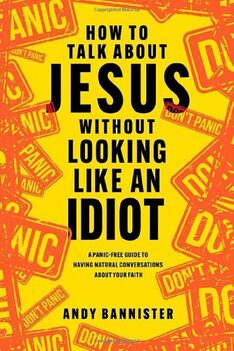
Andy Bannister – How to Talk About Jesus Without Looking like an Idiot
A panic-free guide to having natural conversations about Jesus 8/9/23
You have to feel sorry for Andy Bannister’s children! He is possibly the teller of the worst dad jokes in human history. I am surprised that there isn’t a hazard warning notice on the cover of this book. The cover has the sign: Don’t Panic; perhaps it should say Don’t Laugh, you might encourage him! No seriously, the jokes aside this is a helpful and readable guide to how to speak to people about Jesus.
First, the book deals with the confidence issue. The author deals with a range of common things that make us too afraid to speak about our faith, and using his own story he shows how those fears can be overcome.
Second, the book shows how Jesus models asking questions. This section helpfully shows how we can be too quick to get to the answer, with people being unaware of the need for one.
The four questions he suggests are: What? Why? Wondering? Whether?
He offers the following four examples:
What do you mean by the word god?
Why do you think that all religions lead to god?
Have you ever wondered why we are so drawn to art and beauty?
I wonder whether Christianity makes better sense of human rights and dignity than the alternatives?
Third, the offers advice on how to deal with questions. Here he uses the five steps SHARE:
Sympathise with the person asking the question.
Highlight hidden assumptions made by the questioner.
Apply the Bible to the question.
Retell the gospel to point the questioner to Jesus.
(This section also reinforces what the author has said about connecting the question to what Jesus said, did or a story he told.)
Equip your friend by pointing them to appropriate resources for further exploration.
Most readers would benefit from reading a book like this. It does open up the possibilities of gospel witness and provides some useful tools for engaging in it.
Many books on evangelism suffer from the gift projection of the author and the sense that the evangelistic formula provided is more straightforward in theory than in practice.
Andy Bannister seeks to avoid gift projection, yet I think some people might still be intimidated by this book. While it does avoid merely offering a guaranteed formula, readers might yet ask: why is that the actual non-Christians we talk to seem so much less compliant than those in the books on evangelism?!
This might not be the last word on evangelism for the timid, but it is a good start. Keep calm and read Andy!
John Woods is a writer and Bible teacher based in West Sussex. He is Director of Training at the School of Preachers in Riga, Latvia.
A panic-free guide to having natural conversations about Jesus 8/9/23
You have to feel sorry for Andy Bannister’s children! He is possibly the teller of the worst dad jokes in human history. I am surprised that there isn’t a hazard warning notice on the cover of this book. The cover has the sign: Don’t Panic; perhaps it should say Don’t Laugh, you might encourage him! No seriously, the jokes aside this is a helpful and readable guide to how to speak to people about Jesus.
First, the book deals with the confidence issue. The author deals with a range of common things that make us too afraid to speak about our faith, and using his own story he shows how those fears can be overcome.
Second, the book shows how Jesus models asking questions. This section helpfully shows how we can be too quick to get to the answer, with people being unaware of the need for one.
The four questions he suggests are: What? Why? Wondering? Whether?
He offers the following four examples:
What do you mean by the word god?
Why do you think that all religions lead to god?
Have you ever wondered why we are so drawn to art and beauty?
I wonder whether Christianity makes better sense of human rights and dignity than the alternatives?
Third, the offers advice on how to deal with questions. Here he uses the five steps SHARE:
Sympathise with the person asking the question.
Highlight hidden assumptions made by the questioner.
Apply the Bible to the question.
Retell the gospel to point the questioner to Jesus.
(This section also reinforces what the author has said about connecting the question to what Jesus said, did or a story he told.)
Equip your friend by pointing them to appropriate resources for further exploration.
Most readers would benefit from reading a book like this. It does open up the possibilities of gospel witness and provides some useful tools for engaging in it.
Many books on evangelism suffer from the gift projection of the author and the sense that the evangelistic formula provided is more straightforward in theory than in practice.
Andy Bannister seeks to avoid gift projection, yet I think some people might still be intimidated by this book. While it does avoid merely offering a guaranteed formula, readers might yet ask: why is that the actual non-Christians we talk to seem so much less compliant than those in the books on evangelism?!
This might not be the last word on evangelism for the timid, but it is a good start. Keep calm and read Andy!
John Woods is a writer and Bible teacher based in West Sussex. He is Director of Training at the School of Preachers in Riga, Latvia.
==cassie woolworth==========
Kansas county commission allows anti-Christian rant despite policy
Johnson County (Kansas) Commission Chair Mike Kelly has taken steps to stifle citizens who are concerned with or critical of county actions, but he apparently welcomes anti-Christian rhetoric that violates commission policy on public comments. The Johnson County Commission has a policy requiring public comments to only be “on matters that pertain to or involve the Johnson County Government.” However, at the March 7, 2024 meeting, local resident Cassie Woolworth came into the meeting virtually to deliver an anti-Christian screed that had nothing to do with “matters that pertain to or involve” the county government. Because public comments are not broadcast at Johnson County Commission meetings, an audio file of the comments was provided to the Sentinel. (The Lion 4/3/24) READ MORE>>>>>
Johnson County (Kansas) Commission Chair Mike Kelly has taken steps to stifle citizens who are concerned with or critical of county actions, but he apparently welcomes anti-Christian rhetoric that violates commission policy on public comments. The Johnson County Commission has a policy requiring public comments to only be “on matters that pertain to or involve the Johnson County Government.” However, at the March 7, 2024 meeting, local resident Cassie Woolworth came into the meeting virtually to deliver an anti-Christian screed that had nothing to do with “matters that pertain to or involve” the county government. Because public comments are not broadcast at Johnson County Commission meetings, an audio file of the comments was provided to the Sentinel. (The Lion 4/3/24) READ MORE>>>>>
 Cassie Woolworth
Cassie Woolworth
“It takes a great deal of arrogance to litter the U.S. with over 200 different sects of Christianity, all with their own unique theology yet insist your sect has the moral authority to speak not for all Christians, but for all people in our country. The founders wrote the Constitution, not the apostles. They added the Bill of Rights, not the 10 Commandments. Their intent was freedom of religion. It was not controlled by religion......Conservative Christians aren’t looking for religious freedom, they’re looking for religious dominance. Well, no offense, but you can’t be Christian and hate gay people. You can’t be Christian and hate people of a different color, or speaking a different language. You can’t be Christian and hate people for living differently than you do. You can’t be Christian and hate people. That is not Christianity.....You made sure I didn’t get lunch at school. When I was thirsty, you made sure I didn’t get water while waiting in line to vote. When I was a stranger, you put razor wire in the water and watched as I drowned. What you did to these you did to me?”
--Cassie Woolworth; Kansas County Commission 4/3/24
--Cassie Woolworth; Kansas County Commission 4/3/24
--jordan wootten--------------------

May 22, 2023:
Jordan Wootten posted an op/ed at the Christian Post where he says American politics left and right "has gone mad." "This world is groaning for men and women to step forward who have the capacity “to live with [our] eyes wide open to the realpolitik of this life” — with all of its disappointment and despair — “and still love what [we] know” (Garber, emphasis added). It is a world desperate for Christians who, as St. Athanasius said of Jesus, find our love “evoked” by the brokenness we see, and who view that brokenness as “cause” and “occasion” for exercising our love on behalf of our neighbors. The arena of American politics is filled with people who are determined to use their words and their energy to tear things down. Our system needs people who will commit not to tearing things down, but to building beautiful things like trust and rapport and bridges across the ideological gulf between Left and Right while firm in conviction, bearing good fruit that lasts beyond an election cycle."
Jordan Wootten posted an op/ed at the Christian Post where he says American politics left and right "has gone mad." "This world is groaning for men and women to step forward who have the capacity “to live with [our] eyes wide open to the realpolitik of this life” — with all of its disappointment and despair — “and still love what [we] know” (Garber, emphasis added). It is a world desperate for Christians who, as St. Athanasius said of Jesus, find our love “evoked” by the brokenness we see, and who view that brokenness as “cause” and “occasion” for exercising our love on behalf of our neighbors. The arena of American politics is filled with people who are determined to use their words and their energy to tear things down. Our system needs people who will commit not to tearing things down, but to building beautiful things like trust and rapport and bridges across the ideological gulf between Left and Right while firm in conviction, bearing good fruit that lasts beyond an election cycle."
==darrell worley===============
July 13, 2018: Picayune Item: Improvements at Friendship Park are first of many planned
Committee members include city of Picayune Grant Manager Christy Goss, Picayune Parks and Recreation Director Trevor Adam, Capt. Theresa Milar with the Picayune Police Department, Picayune Main Street Director Reba Beebe, Rev. Allen Hickman with Resurrection Life Ministries, Rev. Brian Dees, Pastor Darrell Worley of Christian Life Assembly of God and Laura Rutherford.
Committee members include city of Picayune Grant Manager Christy Goss, Picayune Parks and Recreation Director Trevor Adam, Capt. Theresa Milar with the Picayune Police Department, Picayune Main Street Director Reba Beebe, Rev. Allen Hickman with Resurrection Life Ministries, Rev. Brian Dees, Pastor Darrell Worley of Christian Life Assembly of God and Laura Rutherford.
==molly worthen==============
Molly Worthen is an American historian and writer. She is currently a professor of history at the University of North Carolina at Chapel Hill and the author of several books, including Apostles of Reason: The Crisis of Authority in American Evangelicalism. Worthen’s writing has also appeared in The New York Times, Slate, The New Yorker, and other publications. Worthen is known for her insightful commentary on American religion, culture, and politics
 Joey Cocharn
Joey Cocharn
Earlier today, Tuesday May 9, Collin Hansen released an interview with historian Molly Worthen on his podcast, Gospel Bound. What unfolded in the interview was the surprising narrative of Molly Worthen’s evangelical conversion to Christianity. Worthen grew up in Glenn Ellyn in what she described during the interview as a secular home. She completed a Bachelor of Arts at Yale in 2003 and completed her Ph.D. there in 2011. In 2010, she married Michael Morgan, a Ph.D. from Yale (2010) and a professor of international and global history at the University of North Carolina, Chapel Hill.
Worthen is an Associate Professor at the University of North Carolina, Chapel Hill. She is an expert in American religious and intellectual history and has produced courses with The Great Courses, including The History of Christianity II: From the Reformation to the Modern Mega Church. She is a highly regarded journalist with numerous pieces published in the New York Times, most recently among these pieces includes “How Would You Prove that God Performed a Miracle?”. One of the most significant journalistic pieces that she has written for evangelical audiences is her 2010 cover story for Christianity Today, “The Reformer,” which profiled Southern Baptist Theological Seminary’s President, Al Mohler.
Her 2013 Oxford publication, Apostles of Reason: The Crisis of Authority in American Evangelicalism, established her as a leading expert in the history of modern evangelicalism. While a penetrating and perceptive interrogation of the rise of the neo-evangelical movement, her book also included fascinating anecdotes or asides, like Wes Craven’s studies at Wheaton College and Mark Noll’s correspondence with Francis Schaeffer. More significantly, her work brought attention to denominations adjacent to insider neo-evangelicals, who struggled to earn respectability and inclusion at the neo-evangelical table.
--Joey Cochran; Anxious Bench; The Evangelical Conversion Narrative of Molly Worthen 5.9.23
Worthen is an Associate Professor at the University of North Carolina, Chapel Hill. She is an expert in American religious and intellectual history and has produced courses with The Great Courses, including The History of Christianity II: From the Reformation to the Modern Mega Church. She is a highly regarded journalist with numerous pieces published in the New York Times, most recently among these pieces includes “How Would You Prove that God Performed a Miracle?”. One of the most significant journalistic pieces that she has written for evangelical audiences is her 2010 cover story for Christianity Today, “The Reformer,” which profiled Southern Baptist Theological Seminary’s President, Al Mohler.
Her 2013 Oxford publication, Apostles of Reason: The Crisis of Authority in American Evangelicalism, established her as a leading expert in the history of modern evangelicalism. While a penetrating and perceptive interrogation of the rise of the neo-evangelical movement, her book also included fascinating anecdotes or asides, like Wes Craven’s studies at Wheaton College and Mark Noll’s correspondence with Francis Schaeffer. More significantly, her work brought attention to denominations adjacent to insider neo-evangelicals, who struggled to earn respectability and inclusion at the neo-evangelical table.
--Joey Cochran; Anxious Bench; The Evangelical Conversion Narrative of Molly Worthen 5.9.23
--Mike woundy------------------
 Mike Woundy
Mike Woundy
"... one does not need to be a Christian (or even religious) to support pro-life policies. A pro-lifer need not be religious, and pro-life arguments do not need to refer to any religious teaching to substantiate their claims. Hence, advocating pro-life policies does not amount to cramming your religion down on non-believers, as is sometimes alleged.
Some may find this claim about the pro-life movement shocking or—more likely—strange. To ease such concerns, perhaps some further clarification is appropriate. By “the pro-life movement,” I am referring to the thought and ideas of the movement—namely, the broad objection to abortion. To be sure, the pro-life movement has historically been religious, but I wish to emphasize the cognitive content of the pro-life movement rather than engage in historical investigation. Hence, to demonstrate the claim that the pro-life movement is not necessarily Christian (or religious), it is useful to outline what the general pro-life argument is. First, for brevity’s sake, we understand that murder is the intentional and wrongful killing of a human person. Next, we can lay out the argument as:
Some may find this claim about the pro-life movement shocking or—more likely—strange. To ease such concerns, perhaps some further clarification is appropriate. By “the pro-life movement,” I am referring to the thought and ideas of the movement—namely, the broad objection to abortion. To be sure, the pro-life movement has historically been religious, but I wish to emphasize the cognitive content of the pro-life movement rather than engage in historical investigation. Hence, to demonstrate the claim that the pro-life movement is not necessarily Christian (or religious), it is useful to outline what the general pro-life argument is. First, for brevity’s sake, we understand that murder is the intentional and wrongful killing of a human person. Next, we can lay out the argument as:
- Murder is wrong.
- Abortion is murder.
- Therefore, abortion is wrong.
--brent wright-------------------
 Brent Wright
Brent Wright
Ephesians 2:8 “For by grace you have been saved through faith, and that not of yourselves; it is the gift of God.”
By the grace of God we have been given salvation. Grace is a subject that could be discussed for days. I like to say that grace is “God’s riches at Christ expense.” This gift may be free to us, but it cost Jesus His life. We need to be careful however, because grace does not give us a license to continue to sin willfully. Romans 6:1 addresses this. “Shall we continue in sin that grace may abound?” Paul answers his own question in the next verse. “God forbid” or may it never be. That is pretty strong language. We have no right to keep on sinning, hoping that God will keep on forgiving us.
-Brent Wright; North Broadway Church of Christ in Sidney, Ohio
By the grace of God we have been given salvation. Grace is a subject that could be discussed for days. I like to say that grace is “God’s riches at Christ expense.” This gift may be free to us, but it cost Jesus His life. We need to be careful however, because grace does not give us a license to continue to sin willfully. Romans 6:1 addresses this. “Shall we continue in sin that grace may abound?” Paul answers his own question in the next verse. “God forbid” or may it never be. That is pretty strong language. We have no right to keep on sinning, hoping that God will keep on forgiving us.
-Brent Wright; North Broadway Church of Christ in Sidney, Ohio
--mary ellen wright--------------
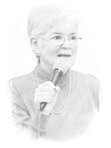 Mary Ellen Wright
Mary Ellen Wright
Psalm 91 is likely the “home” address for all believers. Until we experience this psalm, we will forever be in search...All the promises of this psalm hinge on this first phrase. DWELLING is not an option. Dwelling is a must if we want to experience the benefits listed in Psalm 91. -Mary Ellen Wright; Hear Gods Heart; Where Are You Dwelling? Psalm 91:1a 5.11.20
--matthew wright----------------
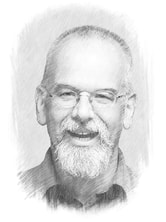 Bob Smietana
Bob Smietana
The center draws on contemplative practices from the Christian faith and from other traditions, he said, and has hosted programs on spirituality as well as social issues such as racism and gender.
It’s also hosted speakers, including Kimberly Wilson, who performed “A Journey,” her one-woman show about Black women who shaped American history; writer Sadhvi Bhagawati Saraswati, author of “Hollywood to the Himalayas,” which details her life as a Hindu convert; and the Rev. Matthew Wright, an Episcopal priest and Sufi practitioner who teaches about contemplation. A current series features author Mark Greene, host of the “Remaking Manhood” podcast.
While the center’s ties to the church are clear and its events are held in the Trinity parish hall, there’s no proselytizing or promotion of exclusively Christian beliefs. During its startup phase the center will remain under the umbrella of the church but it is treated like a community service, more akin to the preschool that operates at Trinity than a church program. --Bob Smietana; Religion News Service: A 300-year-old church hopes to connect with spiritual but not religious neighbors 2.15.23
It’s also hosted speakers, including Kimberly Wilson, who performed “A Journey,” her one-woman show about Black women who shaped American history; writer Sadhvi Bhagawati Saraswati, author of “Hollywood to the Himalayas,” which details her life as a Hindu convert; and the Rev. Matthew Wright, an Episcopal priest and Sufi practitioner who teaches about contemplation. A current series features author Mark Greene, host of the “Remaking Manhood” podcast.
While the center’s ties to the church are clear and its events are held in the Trinity parish hall, there’s no proselytizing or promotion of exclusively Christian beliefs. During its startup phase the center will remain under the umbrella of the church but it is treated like a community service, more akin to the preschool that operates at Trinity than a church program. --Bob Smietana; Religion News Service: A 300-year-old church hopes to connect with spiritual but not religious neighbors 2.15.23
--Robert Wuthnow---------------
Churches are breaking the law and endorsing in elections, experts say. The IRS looks the other way.
While some Black churches have crossed the line into political endorsements, the long legacy of political activism in these churches stands in sharp contrast to white evangelical churches, where some pastors argue devout Christians must take control of government positions, said Robert Wuthnow, the former director of the Princeton University Center for the Study of Religion. Wuthnow said long-standing voter outreach efforts inside Black churches, such as Souls to the Polls, which encourages voting on Sundays after church services, largely stay within the boundaries of the law. “The Black church has been so keenly aware of its marginalized position,” Wuthnow said. “The Black church, historically, was the one place where Black people could mobilize, could organize, could feel that they had some power at the local level. The white evangelical church has power. It’s in office. It’s always had power.” (Jeremy Schwartz/Texas Tribune 10/30/22)
READ MORE>>>>>
While some Black churches have crossed the line into political endorsements, the long legacy of political activism in these churches stands in sharp contrast to white evangelical churches, where some pastors argue devout Christians must take control of government positions, said Robert Wuthnow, the former director of the Princeton University Center for the Study of Religion. Wuthnow said long-standing voter outreach efforts inside Black churches, such as Souls to the Polls, which encourages voting on Sundays after church services, largely stay within the boundaries of the law. “The Black church has been so keenly aware of its marginalized position,” Wuthnow said. “The Black church, historically, was the one place where Black people could mobilize, could organize, could feel that they had some power at the local level. The white evangelical church has power. It’s in office. It’s always had power.” (Jeremy Schwartz/Texas Tribune 10/30/22)
READ MORE>>>>>
==adam wyatt====================
SBC legal brief sparks outrage and confusion
Several members of the Southern Baptist Convention Executive Committee have expressed outrage over an amicus brief that was submitted in April regarding a reopened case of a sexual abuse survivor. The Louisville Courier-Journal reported on Oct. 27 that the Southern Baptist Theological Seminary, Lifeway Christian Resources and the Southern Baptist Convention Executive Committee had signed the brief, yet the article was the first time members of the Executive Committee had heard of it. Mississippi Baptist pastor Adam Wyatt, a member of the Executive Committee, tweeted, “We had no working knowledge of this as a board. Poor excuse, I know. But it’s true.” “This is deplorable. Unconscionable. Evil,” tweeted Virginia Baptist pastor Chris Davis. “The SBC is lending its voice against a survivor in a case in which it is not named. This is legal cruelty. And it goes against all the good faith efforts within the SBC to support survivors.” (Alexis Jones/The Ashbury Collegian 11/10/23)
READ MORE>>>>>
Several members of the Southern Baptist Convention Executive Committee have expressed outrage over an amicus brief that was submitted in April regarding a reopened case of a sexual abuse survivor. The Louisville Courier-Journal reported on Oct. 27 that the Southern Baptist Theological Seminary, Lifeway Christian Resources and the Southern Baptist Convention Executive Committee had signed the brief, yet the article was the first time members of the Executive Committee had heard of it. Mississippi Baptist pastor Adam Wyatt, a member of the Executive Committee, tweeted, “We had no working knowledge of this as a board. Poor excuse, I know. But it’s true.” “This is deplorable. Unconscionable. Evil,” tweeted Virginia Baptist pastor Chris Davis. “The SBC is lending its voice against a survivor in a case in which it is not named. This is legal cruelty. And it goes against all the good faith efforts within the SBC to support survivors.” (Alexis Jones/The Ashbury Collegian 11/10/23)
READ MORE>>>>>



